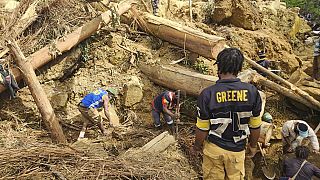Papua New Guinea
A Papua New Guinea government official has reached out to the United Nations, indicating that over 2,000 individuals are believed to have been buried alive in the recent landslide by Friday.
This number starkly contrasts with the U.N.'s estimate of 670 fatalities from the disaster in the mountainous interior of the South Pacific island nation. So far, only the remains of six people have been recovered.
In a communication addressed to the United Nations resident coordinator and dated Sunday, Luseta Laso Mana, the acting director of Papua New Guinea's National Disaster Center, described the landslide's devastating impact on Yambali village in the Enga province, noting that it had "buried more than 2000 people alive" and caused "major destruction."
Estimates of the casualties have been inconsistent, with the International Organization for Migration, actively engaged in the response efforts, maintaining its initial death toll estimate of 670, pending further verification. According to Mana, determining the precise scale of the disaster is challenging due to several factors, including the remote location of the village, communication limitations, and tribal conflicts in the province, necessitating military escorts for relief operations.
The landslide has not only claimed lives but also obstructed a vital stretch of the province's main highway under layers of debris, impeding relief efforts. Recognizing the dire situation, Mana emphasized the ongoing instability of the terrain, posing risks to both rescue teams and survivors.
Efforts to address the catastrophe have begun, with the deployment of heavy machinery donated by a local builder and the involvement of Papua New Guinea's defense minister. However, villagers remain divided over the use of such equipment, concerned about potential damage to buried bodies.
As the situation unfolds, Papua New Guinea's government continues to evaluate the need for additional international assistance, recognizing the long-term economic repercussions of the disaster on the entire country.











01:25
MSF: Access to healthcare in Sudan 'almost impossible' as attacks on healthcare facilities increase
01:55
US contractors say colleagues fired live ammunition at Palestinians seeking food
Go to video
Families grapple with life in the wake of the Israel-Iran Conflict
01:50
UN urges renewed political and climate action in Libya amid humanitarian and governance crises
01:39
Family of Kenyan man shot at close range by police demands accountability
02:35
Aid for hire: For-profit contractors deliver aid in war zones, alarming humanitarian groups